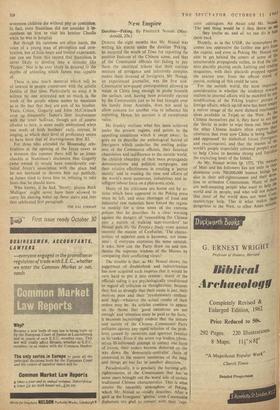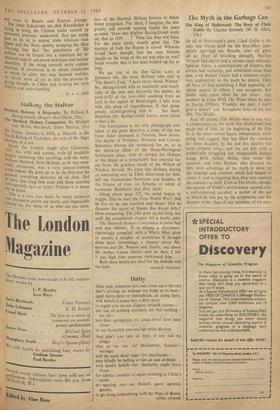New Empire DURING the eight months that Mr. Nossal was
writing his stories under the dateline 'Peking,' he incurred the wrath of Time for reporting the positive features of the Chinese scene, and that of the Communist officials for failing to pay them the uncritical tribute that their curious mixture of arrogance and inferiority complex makes them demand of foreigners. Mr. Nossal, an experienced journalist, was the first non- Communist newspaper correspondent allowed to reside in China long enough to probe beneath the surface, and, having been pointedly ejected by the Communists just as he had brought over his family from Australia, does not need to allow concern for another visa to influence his reporting. Hence. his account is of exceptional value.
He frankly outlines what has been achieved under the present regime, and points to the appalling conditions which it swept away: he goes on to describe the pathological hatred of foreigners which underlies the smiling polite- ness of the Communist officials, their fanatical chauvinism and indifference to the outside world, the childish absurdity of their mass propaganda demonstrations and political campaigns, and their relative effectiveness in creating a 'parrot society' and in wasting the time and efforts of the world's most numerous, industrious and in- telligent tabour force on a pharaonic scale.
Many of his criticisms are borne out by ar- ticles which have appeared in the Peking press since he left, and since shortages of food and industrial raw materials have forced the regime to modify for a time some of the extreme polices that he describes. In a clear warning against the dangers of 'remoulding the Chinese into a nation of walking tape-recorders' (as Nossal puts it), the People's Daily even quoted recently the maxim of Confucius, 'The charac- teristic of superior men is harmony, not same- ness': if everyone expresses the same opinion, it asks, how can the Party draw on and syn- thesise the supreme wisdom of the Masses by comparing their conflicting views?
The trouble is that, as Mr. Nossal shows, the juggernaut of doublethink and indoctrination has now acquired such impetus that it would be very hard to put it into reverse: many of the officials riding it are psychologically conditioned to regard all criticism as thoughtcrime, because they feel so strongly that their cause is just, their motives pure and their 'revolutionary enthusi- asm' high—whatever the actual results of their orders may be. As articles continue to appear on the theme that `good intentions are not enough' and 'attention must be paid to the facts,' it becomes increasingly evident that the history and nature of the Chinese Communist Party militates against any rapid solution of the prob- lems caused by careerists and ignorant fanatics in its ranks. Even if the seven lop leaders (them- selves ill-informed) attempt to correct one form of excess, their orders become distorted on the way down the 'democratic-centralist' chain of command to the remote vastnesses of the land, and things go too far in another direction.
Paradoxically, it is precisely the burning self- righteousness of the Communists that has in some cases brought out the worst side of certain traditional Chinese characteristics. This is what creates the unearthly atmosphere of Peking, which Mr. Nossal so vividly describes. After a spell in the foreigners' ghetto,' even Communist diplomats are glad to consort with their `capie . . they loathe us. and all we can do is hale them back.'
Happily, as in the USSR, the atmosphere be' comes less oppressive the farther one gets from the capital, and even in Peking Mr. Nossal was able to get behind the scenes of some of the innumerable propaganda rallies, to find the citi• nos placidly playing cards, knitting and reading magazines, with their placards propped against, the nearest tree; from the official stand. °` course, nothing of this could be seen For the outside world, the most important consideration is whether the tendency towards realism in internal affairs will be matched by anY modification of the Peking leaders' picture of foreign affairs, which up till now has been srrillhi a mirror image of the most diehard reactionarY ideas available in Taipei or the West. As the Chinese themselves put it, they have to act like the `devils' in order to wipe them out. Mar) the other Chinese leaders often express their obsession that even now China is being `bullied and oppressed' by diabolical forces (foreigner and reactionaries), and that the masses of the world's people (especially coloured people) wade to help China to become strong and liquidate the encircling hosts of the Infidel. As Mr. Nossal writes (p. 137), 'The rnenaCe their of. Mao and his followers lies not only in dominion over 700,000,000 human beingS, bn also in their self-righteousness and their °,..er tion to orthodox Communism. Many of them are well-meaning people who want to help the ` world and its people, and who will not believe that most of the world does not want Cel; munist-type help. This is what makes 1.he, dangerous to the West, to other Asian nations'
and even to Russia and Eastern Europe.
The latest indications are that Khrushchev is trying to bring the Chinese under control .by economic pressure; undaunted, they are trying (just as he is) to extend trade relations with Japan and the West, quietly dropping the Mao Tse-tung line that 'the population of 700 million' can be forged into a substitute for in- vestment capital, advanced technique and nuclear capability. If the swing towards more realistic methuds of revolution is to create conditions in which its aims, too, may become realistic, Re devils' must all try to help the process with 2°1118 thought to China and treating her wIth realism and understanding 'N. A. C. ADIE







































 Previous page
Previous page